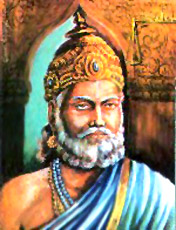Vidura was the half brother to Dhritarashtra (the son of Ambika and Vichitravirya) and Pandu (the father of the Pandavas). In actual, he was the son of the maidservant Ambika and Ambalika, who served the Queens of Hastinapur. In some other accounts, Vidura was an incarnation of Yama or Dharma Raja.
King Vichitravirya married two queens who died childless. Vichitravirya`s mother Satyavati was very anxious about carrying forward the Royal line. As a result of this, she called her other son Vyasa, and asked him to go to the beds of the two queens to father children. Vyasa was a hermit and came to the palace scruffy, as he had been. He went to Ambika. She closed her eyes as she had seen Vyasa and Ambalika became pale to see him. So, both of them gave birth to blind and weak children.
Satyavati again asked Vyasa to go to the bed of Ambika. This time Ambika placed her maidservant instead of sleeping herself. The maidservant was not frightened at all. She gave birth to a perfect child named Vidura. As a result of this Vidura became the half brother of Dhritarashtra and Pandu.
 Bhishma, educated and brought him up along with his half brothers. They called Bhishma their father. Since he had no royal blood in him he had no chance of obtaining the throne and so he served as a minister to his brothers.
Bhishma, educated and brought him up along with his half brothers. They called Bhishma their father. Since he had no royal blood in him he had no chance of obtaining the throne and so he served as a minister to his brothers.
In Mahabharata it has been found that he was the most trusted and wise advisor of the Pandavas after Krishna. He repeatedly warned the Pandavas about Duryodhana`s plot. He was well known for speaking the truth and his intelligence. He saved the Pandavas from being burnt alive in the palace of wax at the hands of Duryodhana and his servants.
Vidura was a true devotee to Lord Krishna. He resigned from the post of Minister in protest against the Mahabharata war.
After the great battle, when Yudhishthira became the ruler, Vidura helped him a lot. He also accompanied Dhritarashtra and his sister-in-law, Gandhari, and Kunti when they left for the forest in their last journey. Vidura died at last in front of his companions on the bank of the river Ganga.



















